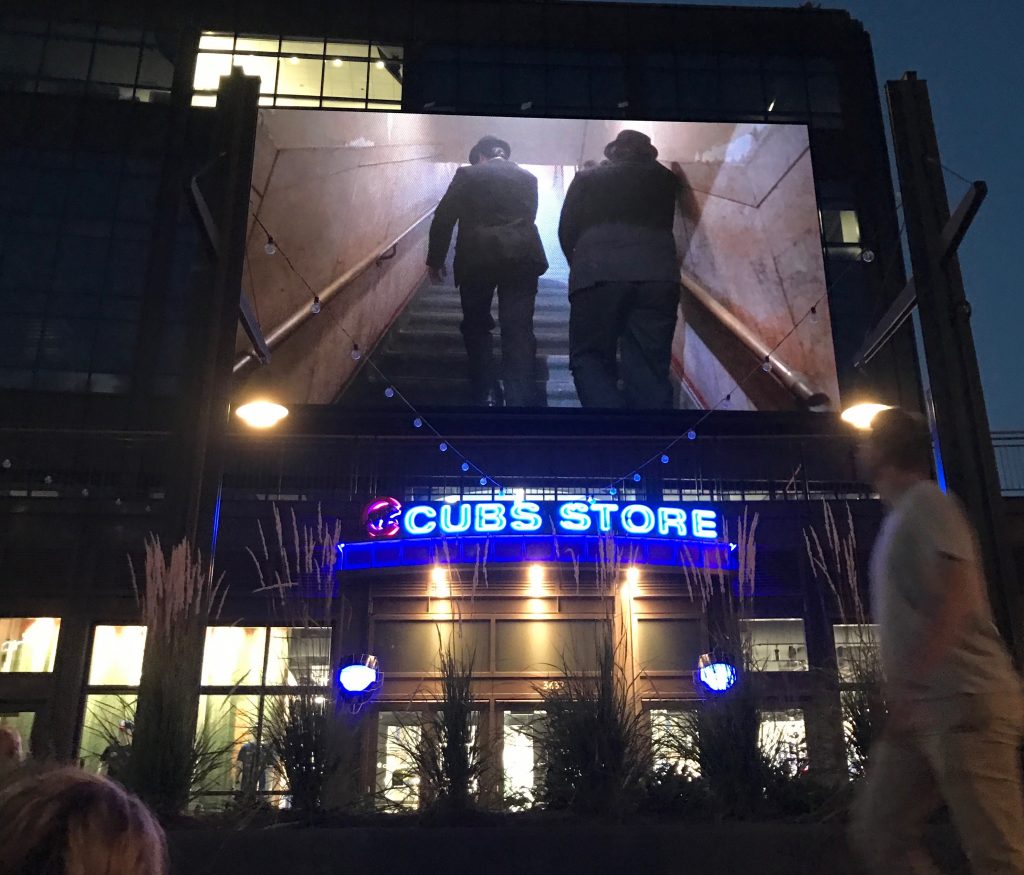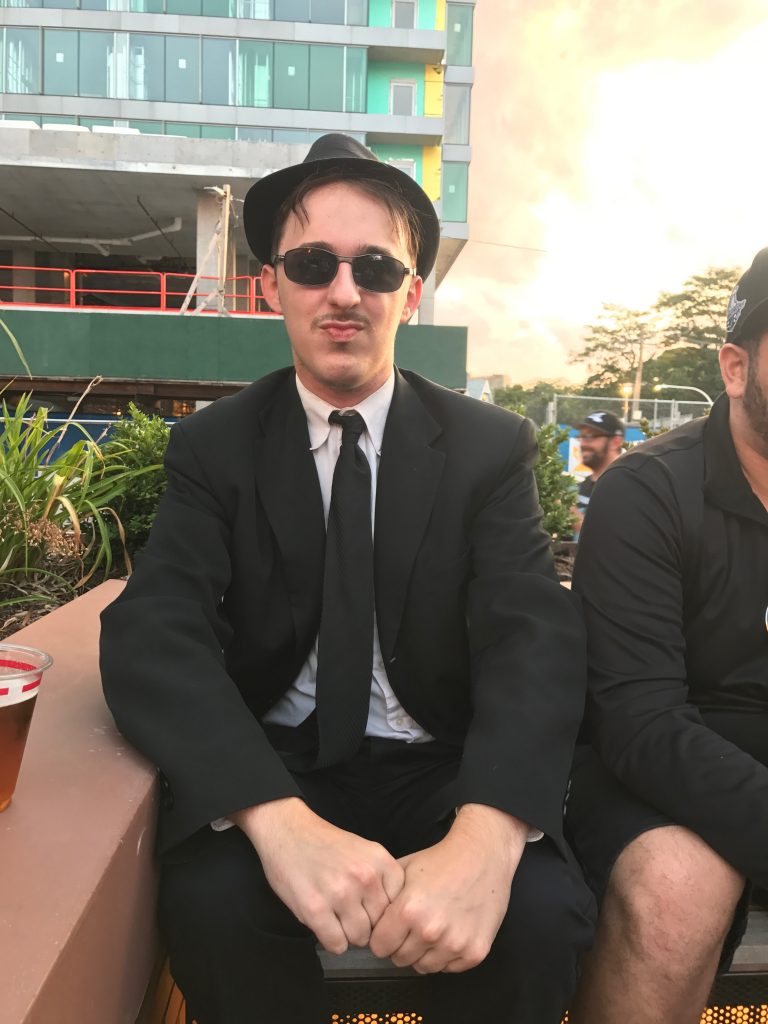Watching 'The Blues Brothers' In Wrigleyville
Closing the loop on gentrification.

“I got an A on my English paper!” the world’s biggest Blues Brothers fan exclaimed. Bruce Pelletier, a local TV producer, leaned forward in his picnic chair. His black t-shirt featured the characters’ monochromatic faces and Elwood’s third act “106 miles to Chicago” monologue, like a bald eagle paired with a quote from the Constitution. Though it seemed like an absentminded non sequitur brought on by too many beers, he tightened his grip on his plastic cup and clarified. During his time at Wright College, he wrote a paper whose thesis was a rebuttal to criticism of The Blues Brothers. “It’s probably my favorite film of all time. It’s such a Chicago movie,” he said.
He’s right. The Blues Brothers is good, actually. On a warm weeknight in late August, a crowd of Chicagoans gathered at the new Park At Wrigley plaza for a free screening of the 1980 Dan Aykroyd/John Belushi classic. The plaza is part of an ongoing $600 million renovation of the neighborhood surrounding Wrigley Field, with a jumbotron perfect for screening films or showing ads.
When the property owners reached out to Ryan Oestriech, “they wanted three themes: Chicago, baseball, and nostalgia.” Oestreich is the general manager of the Music Box Theatre, the Wrigleyville independent cinema that curated the summer’s series of screenings. “Blues Brothers is timeless because it’s an adventure with great ideas, like helping the greater good through music. And Chicago drives the whole plot!” Asked about the changes to the neighborhood, he demurred. “People are against change. If the renovations mean there’s no longer a McDonald’s or a Taco Bell or a parking lot, great. Each neighborhood is unique, that’s the best thing about Chicago. This gives the neighbors something free to come see.”
The attendees had a more mixed response. Pelletier, who works in Wrigleyville, liked the architecture of the new additions, but not the presence of corporations. “It’s pure capitalism. They just wanna make money, but ‘Greed is good’ is not good,” he said. His companion, Gina Pfeiffer, chimed in that they might lure in families who would not normally come to the area.
Her prediction rang true through a survey of the 300-plus people present. There were twentysomethings clustered around pizzas and packs of teens clutching skateboards, but the majority of the crowd were families, eager for a cheap night out. The plaza offered picnic chair rental for $5 or premium seating for $10, which included personal waitstaff and a charcuterie tray. Most had set up their own chairs or spread out blankets, marking territory before visiting the bar or food truck.
A local blues group composed of four middle-aged white dudes slipped nods to Buddies Guy and Holly into their performance while the crowd waited for the sun to set. Perhaps not wanting to steal thunder from the main event, they abstained from covering any song also covered by the Blues Brothers, sticking to standards like “Not Fade Away” and “Dizzy Miss Lizzy.” Only two people turned their chairs to face the band rather than the screen, but the kids in attendance went all-out to show their appreciation. They hopped and spun around eagerly on the pavement in a kindergarten mosh pit while their parents watched a few feet away.
The Blues Brothers simultaneously invented and perfected cliches with its story of getting the band back together to save an orphanage; it is a refreshingly anti-authority underdog story. Jake and Elwood Blues face the wrath of bar owners, country musicians, Nazis, and the police in their attempt to book a show that can earn them the $5,000 necessary to pay the orphanage’s property tax. The film’s heroes are musicians, ex-convicts, restaurant employees, and volunteers; its anarchic spirit was contagious from the very first car chase. When the Bluesmobile burst through the glass walls of the abandoned Dixie Square mall, Pelletier let out a joyous whoop.
The audience also applauded at the conclusion of every song by legends like Aretha Franklin and Ray Charles. The numerous sight gags, like Carrie Fisher’s character painting her nails while reading a flamethrower instruction manual, garnered excited laughter. The movie’s peak “snobs vs. slobs” moment comes early on, when Jake and Elwood wreak havoc in an upscale French restaurant in order to lure the maitre d back to playing trumpet in their band. The two ignore all norms of fine dining and harass customers at neighboring tables. A six-year-old girl, draped across her mom’s lap, noted the brothers’ “very loud slurping” and mimicked it, as if she too were drinking champagne on a friend’s dime.
The only time tension settled over the audience was during the next scene. The film cuts from the restaurant to an angry crowd held back by a line of cops. They jeer and spit at an assembly of Nazis, flying the swastika flag while their leader recites a pledge of allegiance to Adolf Hitler. A cop informs the protagonists that “those bums won their court case, so they’re marching today.” Such a public display of hate was straight from the headlines in 1980, allowed in a court case started 10 miles northwest of Wrigley Field. Four decades later, it was chillingly authentic.

Before the screening began, a charmingly terrible Elwood impersonator held court. His costume consisted of being tall, thin, and white in a black suit, hat, and sunglasses. He was not dedicated enough to have shaved off his mustache. When asked if “his” film had aged well, he agreed and initially defaulted to reciting the line, “I hate Illinois Nazis.” He soon realized the significance, expanding to say “And Virginia Nazis. Nazis on all sides.” Like the rest of the crowd, he erupted into applause when the onscreen Blues Brothers drove straight through the crowd of Nazis, sending them tumbling humiliated into the river below.
The biggest crowd responses came in reaction to the mere appearance of Wrigley Field, whether visual or spoken. Like an inverse of the need to boo Nazis, applause was instinctual; the hometown crowd ate it up. The stadium’s residents, once notoriously terrible at their job, are now curse-breaking world champions, owned by billionaire Trump supporters. The Blues Brothers, celluloid underdogs, are now ubiquitous via cover bands and music venues, avatars for the city of Chicago. Or at least a certain vision of it.
When the lights came up and the credits rolled, people packed up their things in the shadow of two different luxury construction projects. The orphanage had been saved, and two women headed home marveling that the same family owned all these buildings.
